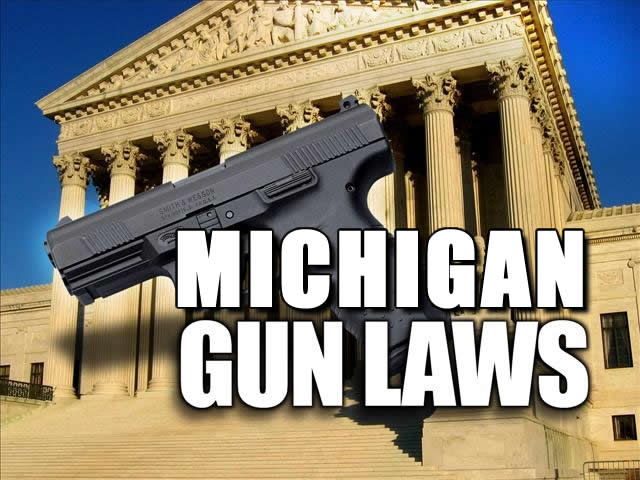
Jul 31, 2018 | Michigan Supreme Court, Your Rights
July 27, 2018 – The Michigan Supreme Court has ruled that the Ann Arbor and Clio school districts have a right to ban guns from their schools
In a very much watched case that deals a blow to gun rights advocates who argued state law prohibits schools from enacting those policies.
Both districts had adopted the policies that barred the possession of guns on school property or at a school-sponsored event.
They each were sued by different groups. One was Michigan Gun Owners with parent Ulysses Wong, sued the Ann Arbor Public Schools. Michigan Open Carry with parent Kenneth Herman filed suit against the Clio Area Schools.
On Friday July 27, 2018, The 4-3 ruling upheld a 2016 ruling by the Michigan Court of Appeals which came to the same conclusion.
Jim Makowski, the attorney for Michigan Gun Owners and Wong, said the decision saddens him because he believes it will do nothing to improve school safety.
“Now criminals can be confident that most school districts are not going to allow firearms on property,” Makowski said. “Now we’ve just created a whole bunch of soft targets that are not going to be protected by an individual with a firearm.”
“Safety is our first and our primary duty, even before our critical mission of teaching and learning,” said Ann Arbor Public Schools Superintendent Jeanice Swift:.
That’s why the district, and its board, pushed the policy.
See the Supreme Court Document

Dec 10, 2016 | Blog, Medical Marijuana, Your Rights
It is a complex and changing area of law. We know that federal law (18 U.S.C. § 922(g)(3)) makes it a felony for an “unlawful user of … any controlled substance” to “possess … any firearm or ammunition.”
Marijuana is classified as a Schedule I controlled substance, so it is a felony for a user of marijuana to possess a firearm or ammunition. Juxtapose this with the fact that 28 states and the District of Columbia have now passed laws legalizing the medicinal and/or recreational use of marijuana.
The main question we get is: “I have a MMMA Card, can I still get a CPL and own and possess firearms?”
To get a License to Purchase a pistol or a Concealed Pistol License in Michigan, you must also pass a federal background check (NICS check). This brings federal law into the Michigan scheme of licensing. The ATF takes the position that anyone with a MMMA card is probably using and therefore they are not allowed to possess a firearm until 12 months after their last use. So, even having a card is a prohibitor in the eyes of the federal government.
Some argue that this may be a leap as a person with a MMMA card may not use marijuana the same as a CPL holder may not ever carry a pistol. The federal law has been challenged and been upheld so far. Courts have, without any real empirical evidence, assumed a connection between marijuana use and gun violence.
The Michigan database on who has a MMMA card does not talk to the State or Federal databases that are used for background checks. So, unless the person admits they have the card there is no real way for anyone to find out.
But you must fill out certain forms when you apply for a License to Purchase or CPL and you are stepping into a grey area when the marijuana question must be answered. Hopefully, we will get some clarity from new legislation or court cases in the future to make this interaction between laws more sensible.
More information about medical marijuana and firearms ownership can be found HERE.
About MCRGO:
The Michigan Coalition for Responsible Gun Owners is a non-profit, non-partisan organization. Formed from just eight people in 1996, we now have thousands of members and numerous affiliated clubs across the state. We’re growing larger and more effective every day.
Our mission statement is: “Promoting safe use and ownership of firearms through education, litigation, and legislation” Visit: www.mcrgo.org.
Read more: http://www.ammoland.com/2016/12/michigan-medical-marijuana-gun-ownership-cpls/#ixzz4SUjTbrTP

Oct 16, 2016 | Blog, News, USA news, Your Rights
SAN FRANCISCO — A federal ban on the sale of guns to medical marijuana card holders does not violate the Second Amendment, a federal appeals court said Wednesday.
The ruling by the 9th U.S. Circuit Court of Appeals applies to the nine Western states that fall under the court’s jurisdiction, including California, Washington and Oregon.
It came in a lawsuit filed by S. Rowan Wilson, a Nevada woman who said she tried to buy a firearm for self-defense in 2011 after obtaining a medical marijuana card. The gun store refused, citing the federal rule banning the sale of firearms to illegal drug users.
Marijuana remains illegal under federal law.
Wilson said she was not a marijuana user, but obtained the card in part as an expression of support for marijuana legalization.
She challenged guidance issued by the federal Bureau of Alcohol, Tobacco, Firearms and Explosives in 2011 that said gun sellers should assume people with medical marijuana cards use the drug and not sell them firearms.
It’s illegal for a licensed firearm dealer to sell a gun to an Oregon medical or recreational marijuana consumer, said Portland lawyer Leland Berger. He noted that the ruling is focused on sales and doesn’t affect medical marijuana consumers who already have guns.
The 9th Circuit in its 3-0 decision said it was reasonable for federal regulators to assume a medical marijuana card holder was more likely to use the drug.
The court also said Congress had reasonably concluded that marijuana and other drug use “raises the risk of irrational or unpredictable behavior with which gun use should not be associated.”
“The notion that cannabis consumers are violent people is absurd,” Berger said, calling the notion that classifying medical card holders who use marijuana to treat debilitating medical conditions as violent people is “even more absurd.”
Paul Armentano, deputy director of NORML, a nonprofit that works to reform marijuana laws, called on Congress to “amend cannabis’ criminal status in a way that comports with both public and scientific opinion, as well as its rapidly changing legal status under state laws.”
“Responsible adults who use cannabis in a manner that is compliant with the laws of their states ought to receive the same legal rights and protections as do other citizens,” he said in a statement published on the nonprofit’s website.
Wilson’s attorney, Chaz Rainey, said there needs to be more consistency in the application of the Second Amendment. He planned to appeal the decision and his options include submitting the appeal to the same panel of judges that issued the ruling, a larger panel of the circuit court or the U.S. Supreme Court.
“We live in a world where having a medical marijuana card is enough to say you don’t get a gun, but if you’re on the no fly list your constitutional right is still protected,” he said.
The 9th Circuit also rejected other constitutional challenges to the ban that were raised by Wilson, including her argument that her gun rights were being stripped without due process.
Armentano said the idea that marijuana users were more prone to violence is a fallacy.
“Responsible adults who use cannabis in a manner that is compliant with the laws of their states ought to receive the same legal rights and protections as other citizens,” he said.
Alex Kreit, a marijuana law expert at Thomas Jefferson School of Law in San Diego, said the ruling was significant — but may not be the last time the 9th Circuit addresses medical marijuana and gun rights.
“It seems like the court did not foreclose the possibility of a challenge by actual medical marijuana users that they shouldn’t be lumped with other drug users in terms of concerns about violence,” he said.
— The Associated Press
September 01, 2016



